Android uses Java as a platform for development. This helps us with many low level issues including memory management, platform type dependencies, and so on. However we still sometimes get crashes with OutOfMemory. So where’s the garbage collector?
I’m going to focus on one of the cases where big objects in memory can’t be cleared for a lengthy period of time. This case is not ultimately a memory leak - objects will be collected at some point - so we sometimes ignore it. This is not advisable as it can sometimes lead to OOM errors.
The case I’m describing is the Handler leak, which is usually detected as a warning by Lint.
Basic Example
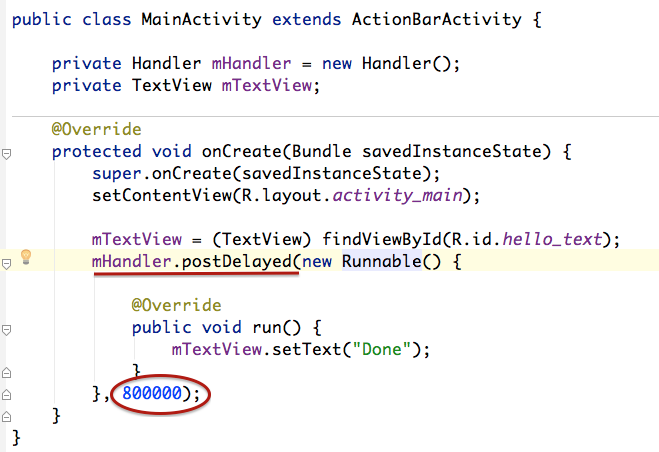
This is a very basic activity. Notice that this anonymous Runnable has been posted to the Handler with a very long delay. We’ll run it and rotate the phone couple of times, then dump memory and analyze it.
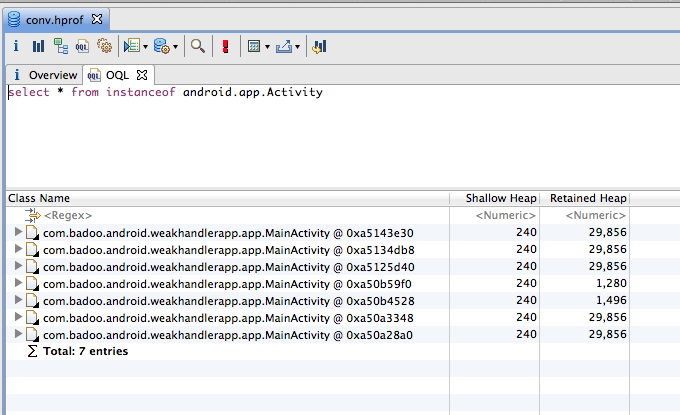
We have seven activities in memory now. This is definitely not good. Let’s find out why GC is not able to clear them.ps.The query I made to get a list of all Activities remaining in memory was created in OQL (Object Query Language), which is very simple, yet powerful.

As you can see, one of the activities is referenced by this$0. This is an indirect reference from the anonymous class to the owner class. This$0 is referenced by callback, which is then referenced by a chain of next’s of Message back to the main thread.Any time you create a non-static class inside the owner class, Java creates an indirect reference to the owner.
Once you post Runnable or Message into Handler, it’s then stored in list of Message commands referenced from LooperThread until the message is executed. Posting delayed messages is a clear leak for at least the time of the delay value. Posting without delay may cause a temporary leak as well if the queue of messages is large.
Static Runnable Solution
Let’s try to overcome a memory leak by getting rid of this$0, by converting the anonymous class to static.
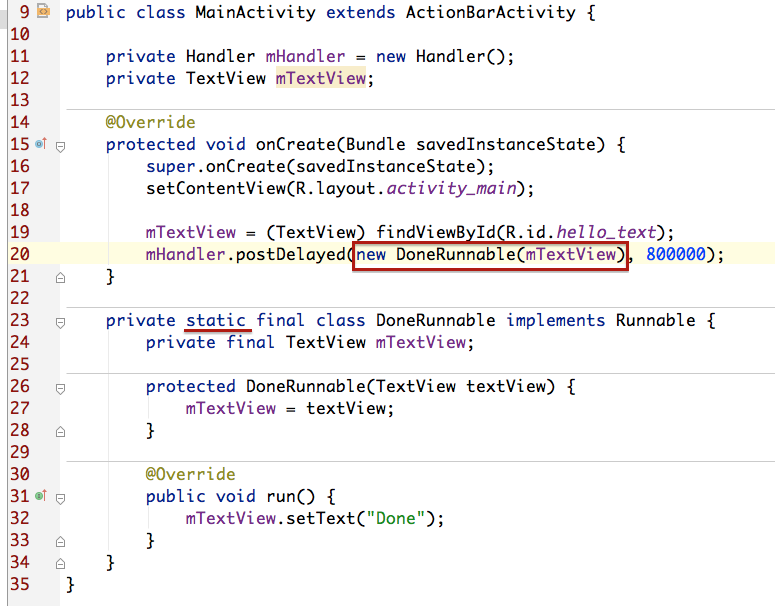
Run, rotate and get the memory dump.
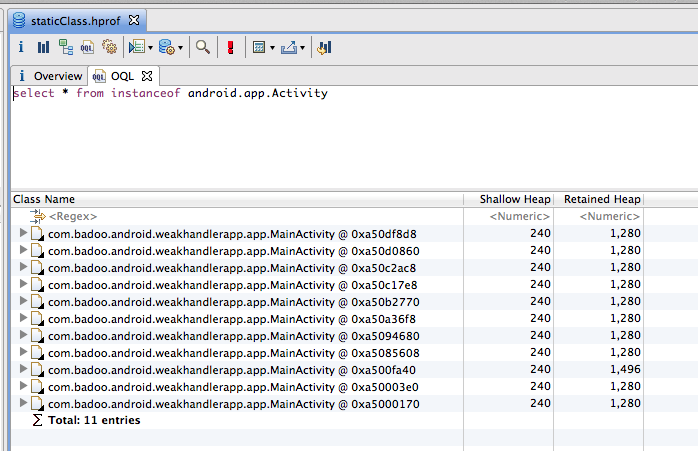
What, again? Let’s see who keeps referring to Activities.
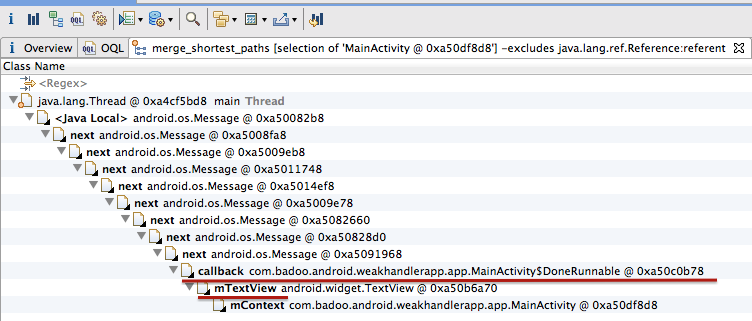
Take a look at the bottom of the tree - activity is kept as a reference to mContext inside mTextView of our DoneRunnable class. Using static inner classes is not enough to overcome memory leaks, however. We need to do more.
Static Runnable With WeakReference
Let’s continue using iterative fixes and get rid of the reference to TextView, which keeps activity from being destroyed.
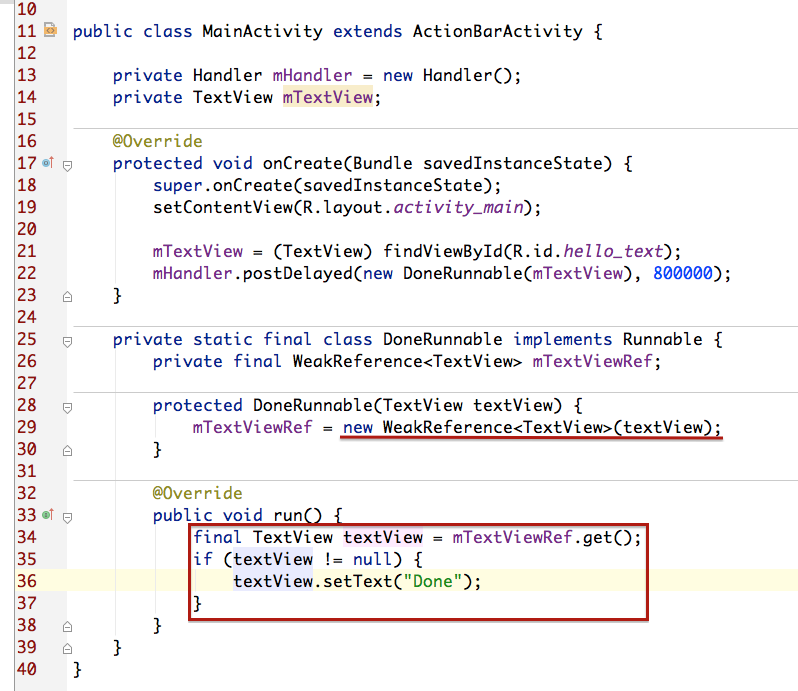
Note that we are keeping WeakReference to TextView, and let’s run, rotate and dump memory.Be careful with WeakReferences. They can be null at any moment, so resolve them first to a local variable (hard reference) and then check to null before use.
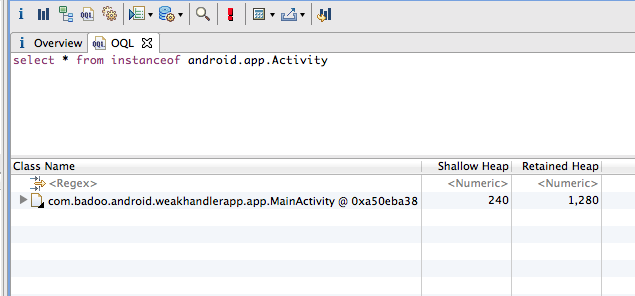
Hooray! Only one activity instance. This solves our memory problem.
So for this approach we should:
- Use static inner classes (or outer classes)
- Use
WeakReference to all objects manipulated from Handler/Runnable
If you compare this code to the initial code, you might find a big difference in readability and code clearance. The initial code is much shorter and much clearer, and you’ll see that eventually, text in textView will be changed to ‘Done’. No need to browse the code to realise that.
Writing this much boilerplate code is very tedious, especially if postDelayed is set to a short time, such as 50ms. There are better and clearer solutions.
Cleanup All Messages onDestroy
Handler class has an interesting feature - removeCallbacksAndMessages - which can accept null as argument. It will remove all Runnables and Messages posted to a particular handler. Let’s use it in onDestroy.
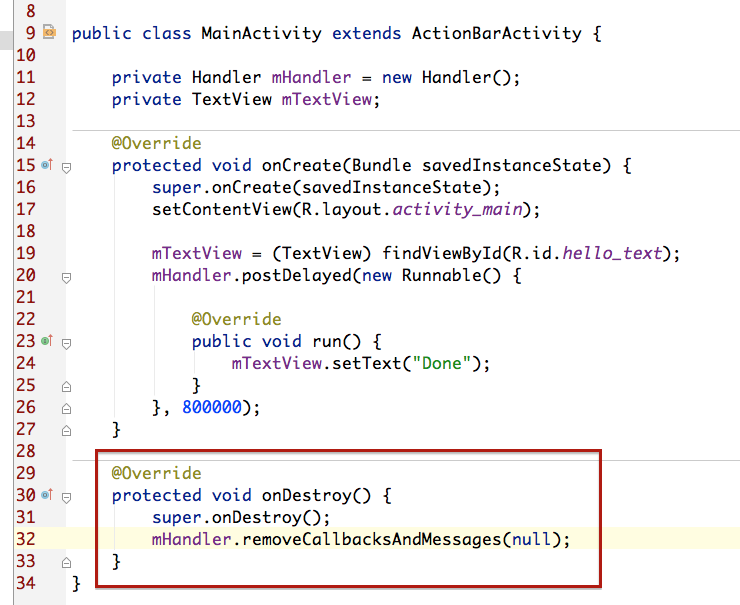
Let’s run, rotate and dump memory.
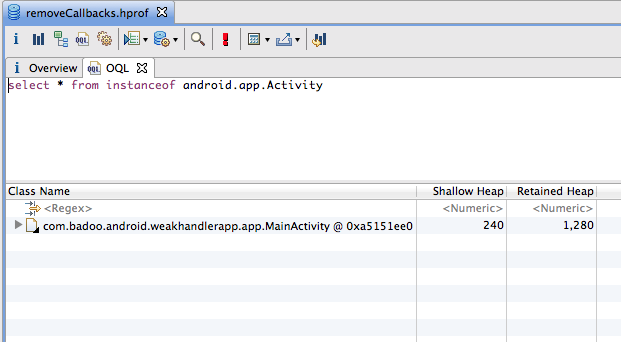
Good! Only one instance.
This approach is way better than the previous one, as it keeps code clear and readable. The only overhead is to remember to clear all messages on activity/fragment destroy.
I have one more solution which, if you’re lazy like me, you might like even more. :)
Use WeakHandler
The Badoo team came up with the interesting idea of introducing WeakHandler - a class that behaves as Handler, but is way safer.
It takes advantage of hard and weak references to get rid of memory leaks. I will describe the idea in detail a bit later, but let’s look at the code first:
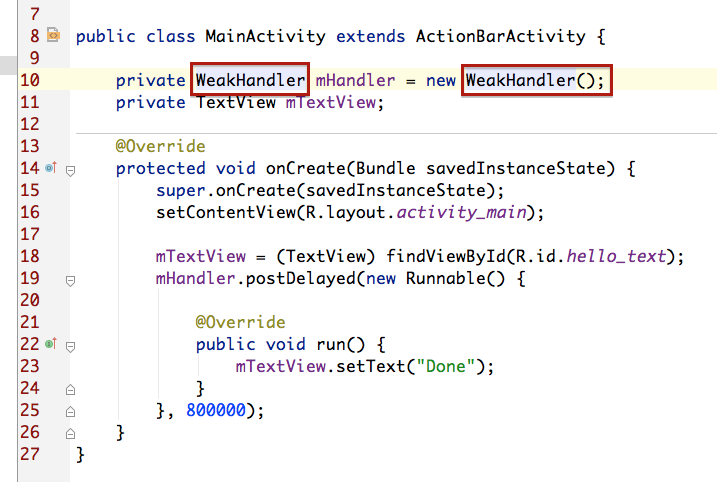
Very similar to the original code apart from one small difference - instead of using android.os.Handler, I’ve used WeakHandler. Let’s run, rotate and dump memory:
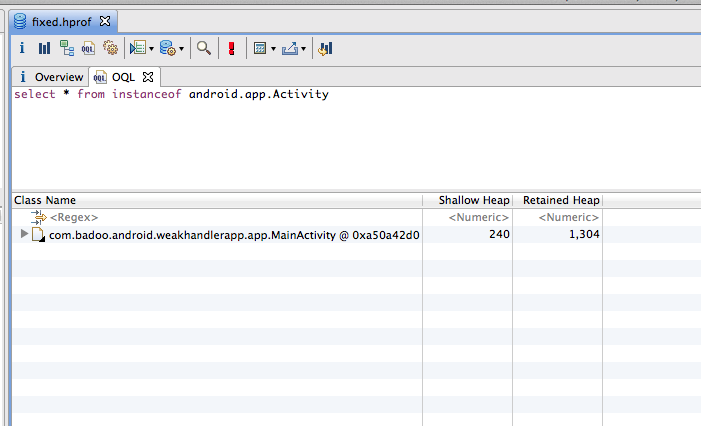
Nice, isn’t it? The code is cleaner than ever, and memory is clean as well! :)
To use it, just add dependency to your build.gradle:
1
2
3
4
5
6
7
8
9
10
11
|
repositories {
maven {
repositories {
url 'https://oss.sonatype.org/content/repositories/releases/'
}
}
}
dependencies {
compile 'com.badoo.mobile:android-weak-handler:1.0'
}
|
And import it in your java class:
1
|
import com.badoo.mobile.util.WeakHandler;
|
Visit Badoo’s github page, where you can fork it, or study it’s source code.
WeakHandler. How it works
The main aim of WeakHandler is to keep Runnables/Messages hard-referenced while WeakHandler is also hard-referenced. Once it can be GC-ed, all messages should go away as well.
Here is a simple diagram that demonstrates differences between using normal Handler and WeakHandler to post anonymous runnables:
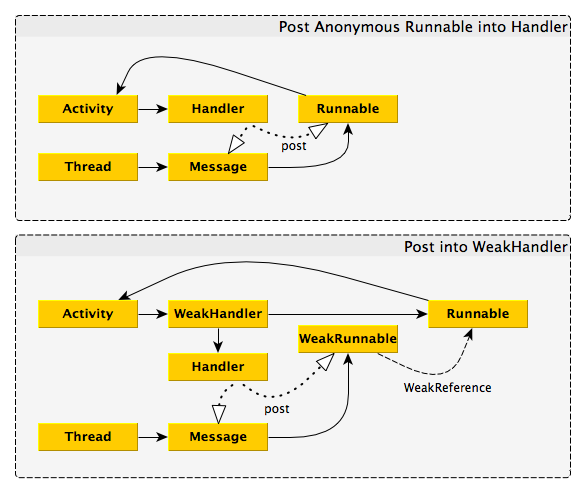
Looking at the top diagram, Activity keeps a reference to Handler, which posts Runnable (puts it into queue of Messages referenced from Thread). Everything is fine except the indirect reference from Runnable to Activity. While Message is in the queue, all graphs can’t be garbage-collected.
By comparison, in the bottom diagram Activity holds WeakHandler, which keeps Handler inside. When we ask it to post Runnable, it is wrapped into WeakRunnable and posted. So the Message queue keeps reference only to WeakRunnable. WeakRunnable keeps weak reference to the desired Runnable, so the Runnable can be garbage-collected.
Another little trick is that WeakHandler still keeps a hard reference to the desired Runnable, to prevent it from being garbage-collected while WeakRunnable is active.
The side-effect of using WeakHandler is that all messages and runnables may not be executed if WeakHandler has been garbage-collected. To prevent that, just keep a reference to it from Activity. Once Activity is ready to be collected, all graphs with WeakHandler will collected as well.
Conclusions
Using postDelayed in Android requires additional effort. To achieve it we came up with three different methods:
- Use a static inner
Runnable/Handler with WeakReference to owner class
- Clear all messages from
Handler in onDestroy of Activity/Fragment
- Use WeakHandler from Badoo as a silver bullet
It’s up to you to choose your preferred technique. The second seems very reasonable, but needs some extra work. The third is my favourite, obviously, but it require some attention as well - WeakHandler should not be used without hard reference from outside.
1
2
3
4
5
6
7
8
9
10
11
12
13
14
15
16
17
18
19
20
21
22
23
24
25
26
27
28
29
30
31
32
33
34
35
36
37
38
39
40
41
42
43
44
45
46
47
48
49
50
51
52
53
54
55
56
57
58
59
60
61
62
63
64
65
66
67
68
69
70
71
72
73
74
75
76
77
78
79
80
81
82
83
84
85
86
87
88
89
90
91
92
93
94
95
96
97
98
99
100
101
102
103
104
105
106
107
108
109
110
111
112
113
114
115
116
117
118
119
120
121
122
123
124
125
126
127
128
129
130
131
132
133
134
135
136
137
138
139
140
141
142
143
144
145
146
147
148
149
150
151
152
153
154
155
156
157
158
159
160
161
162
163
164
165
166
167
168
169
170
171
172
173
174
175
176
177
178
179
180
181
182
183
184
185
186
187
188
189
190
191
192
193
194
195
196
197
198
199
200
201
202
203
204
205
206
207
208
209
210
211
212
213
214
215
216
217
218
219
220
221
222
223
224
225
226
227
228
229
230
231
232
233
234
235
236
237
238
239
240
241
242
243
244
245
246
247
248
249
250
251
252
253
254
255
256
257
258
259
260
261
262
263
264
265
266
267
268
269
270
271
272
273
274
275
276
277
278
279
280
281
282
283
284
285
286
287
288
289
290
291
292
293
294
295
296
297
298
299
300
301
302
303
304
305
306
307
308
309
310
311
312
313
314
315
316
317
318
319
320
321
322
323
324
325
326
327
328
329
330
331
332
333
334
335
336
337
338
339
340
341
342
343
344
345
346
347
348
349
350
351
352
353
354
355
356
357
358
359
360
361
362
363
364
365
366
367
368
369
370
371
372
373
374
375
376
377
378
379
380
381
382
383
384
385
386
387
388
389
390
391
392
393
394
395
396
397
398
399
400
401
402
403
404
405
406
407
408
409
410
411
412
413
414
415
416
417
418
419
420
421
422
423
424
425
426
427
428
429
430
431
432
433
434
435
436
437
438
439
440
441
442
443
444
445
446
447
448
449
450
451
452
453
454
455
456
457
458
459
460
461
462
463
464
465
466
467
468
469
470
471
472
473
474
475
476
477
478
479
480
481
482
483
484
485
486
487
488
489
490
491
492
|
package com.badoo.mobile.util;
import android.os.Handler;
import android.os.Looper;
import android.os.Message;
import android.support.annotation.NonNull;
import android.support.annotation.Nullable;
import android.support.annotation.VisibleForTesting;
import java.lang.ref.WeakReference;
import java.util.concurrent.locks.Lock;
import java.util.concurrent.locks.ReentrantLock;
/**
* Memory safer implementation of android.os.Handler
* <p/>
* Original implementation of Handlers always keeps hard reference to handler in queue of execution.
* If you create anonymous handler and post delayed message into it, it will keep all parent class
* for that time in memory even if it could be cleaned.
* <p/>
* This implementation is trickier, it will keep WeakReferences to runnables and messages,
* and GC could collect them once WeakHandler instance is not referenced any more
* <p/>
*
* @see android.os.Handler
*
* Created by Dmytro Voronkevych on 17/06/2014.
*/
@SuppressWarnings("unused")
public class WeakHandler {
private final Handler.Callback mCallback; // hard reference to Callback. We need to keep callback in memory
private final ExecHandler mExec;
private Lock mLock = new ReentrantLock();
@SuppressWarnings("ConstantConditions")
@VisibleForTesting
final ChainedRef mRunnables = new ChainedRef(mLock, null);
/**
* Default constructor associates this handler with the {@link Looper} for the
* current thread.
*
* If this thread does not have a looper, this handler won't be able to receive messages
* so an exception is thrown.
*/
public WeakHandler() {
mCallback = null;
mExec = new ExecHandler();
}
/**
* Constructor associates this handler with the {@link Looper} for the
* current thread and takes a callback interface in which you can handle
* messages.
*
* If this thread does not have a looper, this handler won't be able to receive messages
* so an exception is thrown.
*
* @param callback The callback interface in which to handle messages, or null.
*/
public WeakHandler(@Nullable Handler.Callback callback) {
mCallback = callback; // Hard referencing body
mExec = new ExecHandler(new WeakReference<>(callback)); // Weak referencing inside ExecHandler
}
/**
* Use the provided {@link Looper} instead of the default one.
*
* @param looper The looper, must not be null.
*/
public WeakHandler(@NonNull Looper looper) {
mCallback = null;
mExec = new ExecHandler(looper);
}
/**
* Use the provided {@link Looper} instead of the default one and take a callback
* interface in which to handle messages.
*
* @param looper The looper, must not be null.
* @param callback The callback interface in which to handle messages, or null.
*/
public WeakHandler(@NonNull Looper looper, @NonNull Handler.Callback callback) {
mCallback = callback;
mExec = new ExecHandler(looper, new WeakReference<>(callback));
}
/**
* Causes the Runnable r to be added to the message queue.
* The runnable will be run on the thread to which this handler is
* attached.
*
* @param r The Runnable that will be executed.
*
* @return Returns true if the Runnable was successfully placed in to the
* message queue. Returns false on failure, usually because the
* looper processing the message queue is exiting.
*/
public final boolean post(@NonNull Runnable r) {
return mExec.post(wrapRunnable(r));
}
/**
* Causes the Runnable r to be added to the message queue, to be run
* at a specific time given by <var>uptimeMillis</var>.
* <b>The time-base is {@link android.os.SystemClock#uptimeMillis}.</b>
* The runnable will be run on the thread to which this handler is attached.
*
* @param r The Runnable that will be executed.
* @param uptimeMillis The absolute time at which the callback should run,
* using the {@link android.os.SystemClock#uptimeMillis} time-base.
*
* @return Returns true if the Runnable was successfully placed in to the
* message queue. Returns false on failure, usually because the
* looper processing the message queue is exiting. Note that a
* result of true does not mean the Runnable will be processed -- if
* the looper is quit before the delivery time of the message
* occurs then the message will be dropped.
*/
public final boolean postAtTime(@NonNull Runnable r, long uptimeMillis) {
return mExec.postAtTime(wrapRunnable(r), uptimeMillis);
}
/**
* Causes the Runnable r to be added to the message queue, to be run
* at a specific time given by <var>uptimeMillis</var>.
* <b>The time-base is {@link android.os.SystemClock#uptimeMillis}.</b>
* The runnable will be run on the thread to which this handler is attached.
*
* @param r The Runnable that will be executed.
* @param uptimeMillis The absolute time at which the callback should run,
* using the {@link android.os.SystemClock#uptimeMillis} time-base.
*
* @return Returns true if the Runnable was successfully placed in to the
* message queue. Returns false on failure, usually because the
* looper processing the message queue is exiting. Note that a
* result of true does not mean the Runnable will be processed -- if
* the looper is quit before the delivery time of the message
* occurs then the message will be dropped.
*
* @see android.os.SystemClock#uptimeMillis
*/
public final boolean postAtTime(Runnable r, Object token, long uptimeMillis) {
return mExec.postAtTime(wrapRunnable(r), token, uptimeMillis);
}
/**
* Causes the Runnable r to be added to the message queue, to be run
* after the specified amount of time elapses.
* The runnable will be run on the thread to which this handler
* is attached.
*
* @param r The Runnable that will be executed.
* @param delayMillis The delay (in milliseconds) until the Runnable
* will be executed.
*
* @return Returns true if the Runnable was successfully placed in to the
* message queue. Returns false on failure, usually because the
* looper processing the message queue is exiting. Note that a
* result of true does not mean the Runnable will be processed --
* if the looper is quit before the delivery time of the message
* occurs then the message will be dropped.
*/
public final boolean postDelayed(Runnable r, long delayMillis) {
return mExec.postDelayed(wrapRunnable(r), delayMillis);
}
/**
* Posts a message to an object that implements Runnable.
* Causes the Runnable r to executed on the next iteration through the
* message queue. The runnable will be run on the thread to which this
* handler is attached.
* <b>This method is only for use in very special circumstances -- it
* can easily starve the message queue, cause ordering problems, or have
* other unexpected side-effects.</b>
*
* @param r The Runnable that will be executed.
*
* @return Returns true if the message was successfully placed in to the
* message queue. Returns false on failure, usually because the
* looper processing the message queue is exiting.
*/
public final boolean postAtFrontOfQueue(Runnable r) {
return mExec.postAtFrontOfQueue(wrapRunnable(r));
}
/**
* Remove any pending posts of Runnable r that are in the message queue.
*/
public final void removeCallbacks(Runnable r) {
final WeakRunnable runnable = mRunnables.remove(r);
if (runnable != null) {
mExec.removeCallbacks(runnable);
}
}
/**
* Remove any pending posts of Runnable <var>r</var> with Object
* <var>token</var> that are in the message queue. If <var>token</var> is null,
* all callbacks will be removed.
*/
public final void removeCallbacks(Runnable r, Object token) {
final WeakRunnable runnable = mRunnables.remove(r);
if (runnable != null) {
mExec.removeCallbacks(runnable, token);
}
}
/**
* Pushes a message onto the end of the message queue after all pending messages
* before the current time. It will be received in callback,
* in the thread attached to this handler.
*
* @return Returns true if the message was successfully placed in to the
* message queue. Returns false on failure, usually because the
* looper processing the message queue is exiting.
*/
public final boolean sendMessage(Message msg) {
return mExec.sendMessage(msg);
}
/**
* Sends a Message containing only the what value.
*
* @return Returns true if the message was successfully placed in to the
* message queue. Returns false on failure, usually because the
* looper processing the message queue is exiting.
*/
public final boolean sendEmptyMessage(int what) {
return mExec.sendEmptyMessage(what);
}
/**
* Sends a Message containing only the what value, to be delivered
* after the specified amount of time elapses.
* @see #sendMessageDelayed(android.os.Message, long)
*
* @return Returns true if the message was successfully placed in to the
* message queue. Returns false on failure, usually because the
* looper processing the message queue is exiting.
*/
public final boolean sendEmptyMessageDelayed(int what, long delayMillis) {
return mExec.sendEmptyMessageDelayed(what, delayMillis);
}
/**
* Sends a Message containing only the what value, to be delivered
* at a specific time.
* @see #sendMessageAtTime(android.os.Message, long)
*
* @return Returns true if the message was successfully placed in to the
* message queue. Returns false on failure, usually because the
* looper processing the message queue is exiting.
*/
public final boolean sendEmptyMessageAtTime(int what, long uptimeMillis) {
return mExec.sendEmptyMessageAtTime(what, uptimeMillis);
}
/**
* Enqueue a message into the message queue after all pending messages
* before (current time + delayMillis). You will receive it in
* callback, in the thread attached to this handler.
*
* @return Returns true if the message was successfully placed in to the
* message queue. Returns false on failure, usually because the
* looper processing the message queue is exiting. Note that a
* result of true does not mean the message will be processed -- if
* the looper is quit before the delivery time of the message
* occurs then the message will be dropped.
*/
public final boolean sendMessageDelayed(Message msg, long delayMillis) {
return mExec.sendMessageDelayed(msg, delayMillis);
}
/**
* Enqueue a message into the message queue after all pending messages
* before the absolute time (in milliseconds) <var>uptimeMillis</var>.
* <b>The time-base is {@link android.os.SystemClock#uptimeMillis}.</b>
* You will receive it in callback, in the thread attached
* to this handler.
*
* @param uptimeMillis The absolute time at which the message should be
* delivered, using the
* {@link android.os.SystemClock#uptimeMillis} time-base.
*
* @return Returns true if the message was successfully placed in to the
* message queue. Returns false on failure, usually because the
* looper processing the message queue is exiting. Note that a
* result of true does not mean the message will be processed -- if
* the looper is quit before the delivery time of the message
* occurs then the message will be dropped.
*/
public boolean sendMessageAtTime(Message msg, long uptimeMillis) {
return mExec.sendMessageAtTime(msg, uptimeMillis);
}
/**
* Enqueue a message at the front of the message queue, to be processed on
* the next iteration of the message loop. You will receive it in
* callback, in the thread attached to this handler.
* <b>This method is only for use in very special circumstances -- it
* can easily starve the message queue, cause ordering problems, or have
* other unexpected side-effects.</b>
*
* @return Returns true if the message was successfully placed in to the
* message queue. Returns false on failure, usually because the
* looper processing the message queue is exiting.
*/
public final boolean sendMessageAtFrontOfQueue(Message msg) {
return mExec.sendMessageAtFrontOfQueue(msg);
}
/**
* Remove any pending posts of messages with code 'what' that are in the
* message queue.
*/
public final void removeMessages(int what) {
mExec.removeMessages(what);
}
/**
* Remove any pending posts of messages with code 'what' and whose obj is
* 'object' that are in the message queue. If <var>object</var> is null,
* all messages will be removed.
*/
public final void removeMessages(int what, Object object) {
mExec.removeMessages(what, object);
}
/**
* Remove any pending posts of callbacks and sent messages whose
* <var>obj</var> is <var>token</var>. If <var>token</var> is null,
* all callbacks and messages will be removed.
*/
public final void removeCallbacksAndMessages(Object token) {
mExec.removeCallbacksAndMessages(token);
}
/**
* Check if there are any pending posts of messages with code 'what' in
* the message queue.
*/
public final boolean hasMessages(int what) {
return mExec.hasMessages(what);
}
/**
* Check if there are any pending posts of messages with code 'what' and
* whose obj is 'object' in the message queue.
*/
public final boolean hasMessages(int what, Object object) {
return mExec.hasMessages(what, object);
}
public final Looper getLooper() {
return mExec.getLooper();
}
private WeakRunnable wrapRunnable(@NonNull Runnable r) {
//noinspection ConstantConditions
if (r == null) {
throw new NullPointerException("Runnable can't be null");
}
final ChainedRef hardRef = new ChainedRef(mLock, r);
mRunnables.insertAfter(hardRef);
return hardRef.wrapper;
}
private static class ExecHandler extends Handler {
private final WeakReference<Handler.Callback> mCallback;
ExecHandler() {
mCallback = null;
}
ExecHandler(WeakReference<Handler.Callback> callback) {
mCallback = callback;
}
ExecHandler(Looper looper) {
super(looper);
mCallback = null;
}
ExecHandler(Looper looper, WeakReference<Handler.Callback> callback) {
super(looper);
mCallback = callback;
}
@Override
public void handleMessage(@NonNull Message msg) {
if (mCallback == null) {
return;
}
final Handler.Callback callback = mCallback.get();
if (callback == null) { // Already disposed
return;
}
callback.handleMessage(msg);
}
}
static class WeakRunnable implements Runnable {
private final WeakReference<Runnable> mDelegate;
private final WeakReference<ChainedRef> mReference;
WeakRunnable(WeakReference<Runnable> delegate, WeakReference<ChainedRef> reference) {
mDelegate = delegate;
mReference = reference;
}
@Override
public void run() {
final Runnable delegate = mDelegate.get();
final ChainedRef reference = mReference.get();
if (reference != null) {
reference.remove();
}
if (delegate != null) {
delegate.run();
}
}
}
static class ChainedRef {
@Nullable
ChainedRef next;
@Nullable
ChainedRef prev;
@NonNull
final Runnable runnable;
@NonNull
final WeakRunnable wrapper;
@NonNull
Lock lock;
public ChainedRef(@NonNull Lock lock, @NonNull Runnable r) {
this.runnable = r;
this.lock = lock;
this.wrapper = new WeakRunnable(new WeakReference<>(r), new WeakReference<>(this));
}
public WeakRunnable remove() {
lock.lock();
try {
if (prev != null) {
prev.next = next;
}
if (next != null) {
next.prev = prev;
}
prev = null;
next = null;
} finally {
lock.unlock();
}
return wrapper;
}
public void insertAfter(@NonNull ChainedRef candidate) {
lock.lock();
try {
if (this.next != null) {
this.next.prev = candidate;
}
candidate.next = this.next;
this.next = candidate;
candidate.prev = this;
} finally {
lock.unlock();
}
}
@Nullable
public WeakRunnable remove(Runnable obj) {
lock.lock();
try {
ChainedRef curr = this.next; // Skipping head
while (curr != null) {
if (curr.runnable == obj) { // We do comparison exactly how Handler does inside
return curr.remove();
}
curr = curr.next;
}
} finally {
lock.unlock();
}
return null;
}
}
}
|
reference













